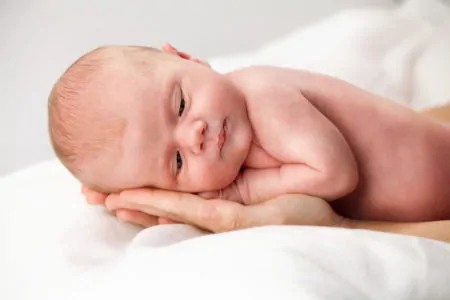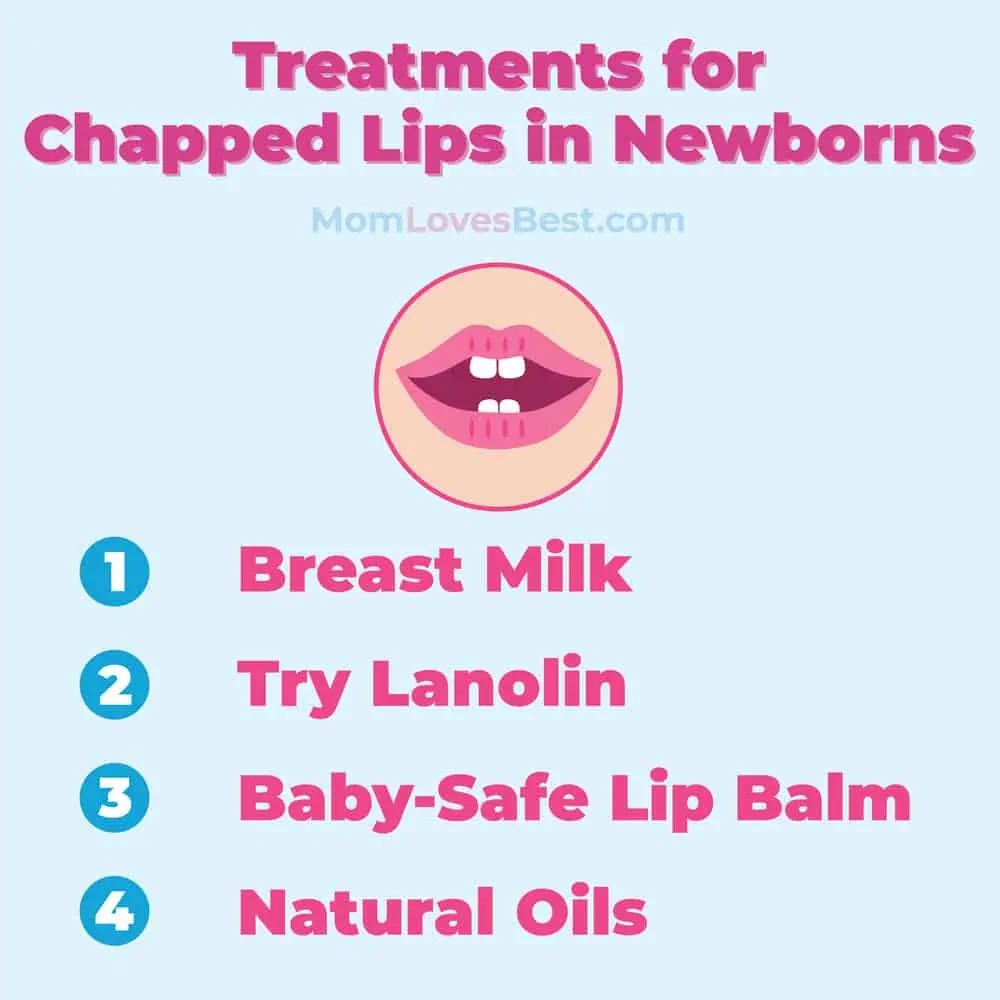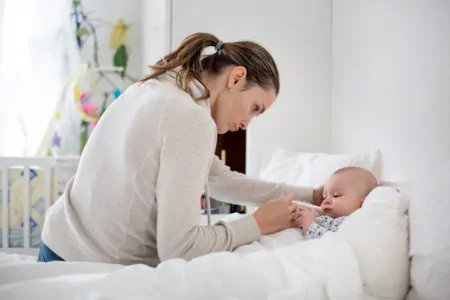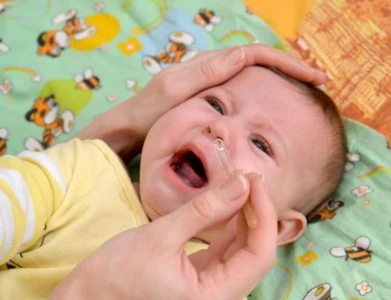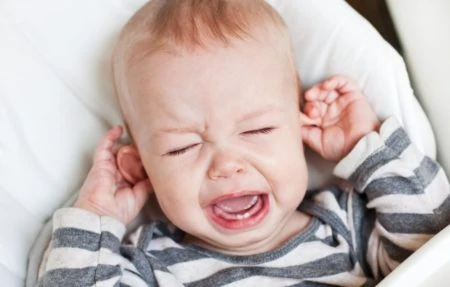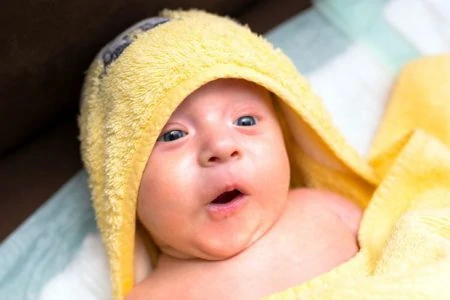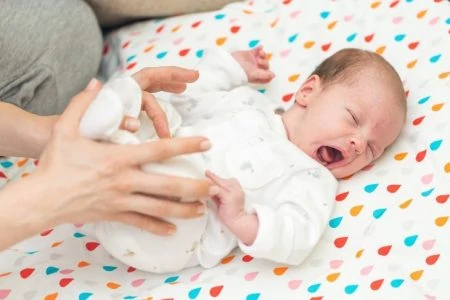Chapped lips are a minor annoyance for adults. We just grab a stick of balm, drink some water, and move on. But when your newborn has dry, cracking, or peeling lips, it feels much scarier. Is it dehydration? Is it an infection?
While newborn chapped lips require gentle care, they are usually easily treated at home. Here is how to spot the cause, soothe the skin, and when to call the doctor.
Key Takeaways
- Common causes: Skin shedding, lip sucking, friction from feeding, weather changes, and sensitive skin are top culprits.
- Safe treatments: Soothe lips with breast milk, lanolin, baby-safe organic balms, or natural oils like coconut oil.
- Avoid adult products: Do not use standard adult lip balms (like ChapStick) on infants; they contain ingredients that are unsafe if ingested.
- Watch for dehydration: Monitor wet diapers. Fewer than six in 24 hours (for newborns) requires immediate pediatric attention.
Causes of Newborn Chapped Lips
1. Skin Shedding
Skin shedding is incredibly common. Once out of the womb, newborns shed the vernix caseosa layer that protected them during gestation. This happens all over the body, including the lips.
You will likely notice peeling and dry skin during this process. The vernix acted as a natural moisturizer; once it is gone, the skin needs time to adapt to the dry air (1).
This peeling usually peaks around two weeks of age, though post-term babies may show it at birth. It looks alarming, but it is a normal biological process. No amount of lotion will stop the shedding, so you just have to wait it out.
2. Lip Sucking and Friction
Babies have a powerful sucking instinct. They often suck on their lips between feedings, creating friction and excess saliva that evaporates and dehydrates the skin.
You might also see “nursing blisters” or “sucking calluses.” These are pads of loose, dry skin in the center of the lip caused by vigorous breastfeeding. They are not painful and do not signal an infection. However, if you see white patches inside the mouth or on the tongue, that could be oral thrush, which requires a doctor’s care (2).
3. Weather Changes
Fluctuating weather hits baby skin hard. Cold wind, low humidity, or excessive heat can draw moisture right out of exposed areas. This is especially prevalent on brisk, windy days or in homes with dry heating systems during winter.
4. Sensitive Skin
Sensitive skin reacts quickly to irritants.
While not every baby reacts this way, some develop chapped lips due to chemical residues found in wipes, face creams, or laundry detergents on their bedding or clothing (3).
5. Medications
Certain medications list dry mucous membranes or skin as a side effect. If your pediatrician prescribes a new medicine and you notice dryness shortly after, ask them if the two are related. This helps rule out environmental causes.
6. Kawasaki Disease
Rarely, chapped lips signal a serious condition called Kawasaki disease. This causes inflammation in the blood vessels and usually affects children between 6 months and 2 years old (4).
Kawasaki disease is not just dry lips. It is accompanied by a persistent fever (lasting at least five days), red rashes, red eyes, and swollen hands or feet. If you see these symptoms combined, seek medical attention immediately.
In clinical practice, I have seen Kawasaki’s Disease in a range of patient ages, but most often in grade school-aged children. The classic presentation is a fever that lasts longer than five days and is associated with an amorphous rash on a variety of body areas, conjunctivitis without pus, and redness of the lips, tongue, and/or throat.Usually, these kids look very sick, prompting the parent to bring them to the office or the emergency room. The chapped lips and peeling of hands usually develop later in the illness. Seeking medical care early is important for initiating treatment that prevents damage to coronary arteries (5).
Editor's Note:
Dr. Leah Alexander, MD, FAAP7. Cheilosis
Cheilosis involves cracked, red, and painful skin specifically at the corners of the mouth. In older infants and toddlers, this can make feeding painful. It is often caused by saliva gathering in the corners of the mouth, leading to a bacterial or fungal infection. Your doctor can prescribe a simple antifungal cream to clear it up (6).
8. Vitamin Deficiencies
While less common in well-fed infants, a deficiency in certain vitamins, specifically Vitamin A, Vitamin B complex (like Riboflavin), or Iron, can manifest as cracked lips. If your baby eats solids and struggles with chronic chapped lips, your pediatrician might review their diet.
Dehydration and Newborn Chapped Lips
Newborns dehydrate faster than adults, especially on hot days or if they are unwell. This happens when they do not ingest enough breast milk or formula to replace lost fluids.
The #1 sign to watch: Wet diapers.
Count the wet diapers in a 24-hour period. If a newborn has fewer than six, they may be dehydrated (7).
Treatment usually involves frequent feeding or an electrolyte solution (8). Consult your pediatrician immediately if numbers drop.
Keep In Mind
Other signs of dehydration include:
- Crying: No tears are produced.
- Skin: Dry skin and lips; skin does not “bounce back” when pinched.
- Eyes: Sunken appearance.
- Extremities: Cold, blotchy hands or feet.
- Heart rate: Fast heartbeat or breathing.
- Head: A sunken fontanelle (soft spot).
- Energy: Extreme drowsiness or lethargy.
Water Is A No-No
Giving an infant water interferes with nutrient absorption from milk and can lead to water intoxication, which causes seizures (9).
Treatment of Chapped Lips in Newborns
1. Breast Milk
If you are breastfeeding, you have the perfect antidote on hand. Breast milk contains fats and antibodies that fight bacteria and moisturize the skin.
Hand express a few drops of milk and gently dab it onto your baby’s lips. It is safe, edible, and helps heal the skin while minimizing infection risks.
2. Lanolin
Lanolin is a waxy fat derived from sheep’s wool. Moms often use it for sore nipples, but it works wonders on baby lips too. It creates a breathable barrier that locks moisture in (10).
It is safe for the baby to ingest in small amounts, making it a great option for cracked lips.
3. Baby-Safe Lip Balm
If you prefer a stick or tube, buy a dedicated organic baby lip balm. These are formulated without menthol, camphor, or artificial flavors. Use it only until the lips heal.
Always check the label. If you cannot pronounce the ingredients, skip it or ask your pediatrician.
4. Natural Oils
Coconut oil and olive oil are kitchen staples that double as gentle moisturizers. They contain fatty acids that soften the skin. Apply a very thin layer to the lips with a clean finger.
Preventing Chapped Lips
- Use a humidifier: Dry air is the enemy. Run a cool-mist humidifier in the nursery to keep the air moist. This also helps with congestion. Avoid warm-mist vaporizers due to burn risks (11).
- Protect from elements: Before heading out into the cold or wind, apply a thin layer of breast milk or baby balm to create a protective shield.
- Skip adult lotions: Strong fragrances in adult creams can dry baby skin further. Stick to baby-safe products.
- Monitor feeding: Ensure your baby feeds frequently. Hydration starts from the inside out. If you notice hard stools or dry diapers, increase feeding sessions.
Can I Apply ChapStick on My Baby?
No. Do not use ChapStick or standard adult lip balms on a newborn.
Adult products often contain medicated ingredients (like camphor or phenols), salicylic acid, sunscreens, or artificial flavors that are not safe for infants to swallow. Since babies lick their lips constantly, they will ingest whatever you apply.
Stick to single-ingredient remedies like lanolin, coconut oil, or balms specifically certified for infants (12).
